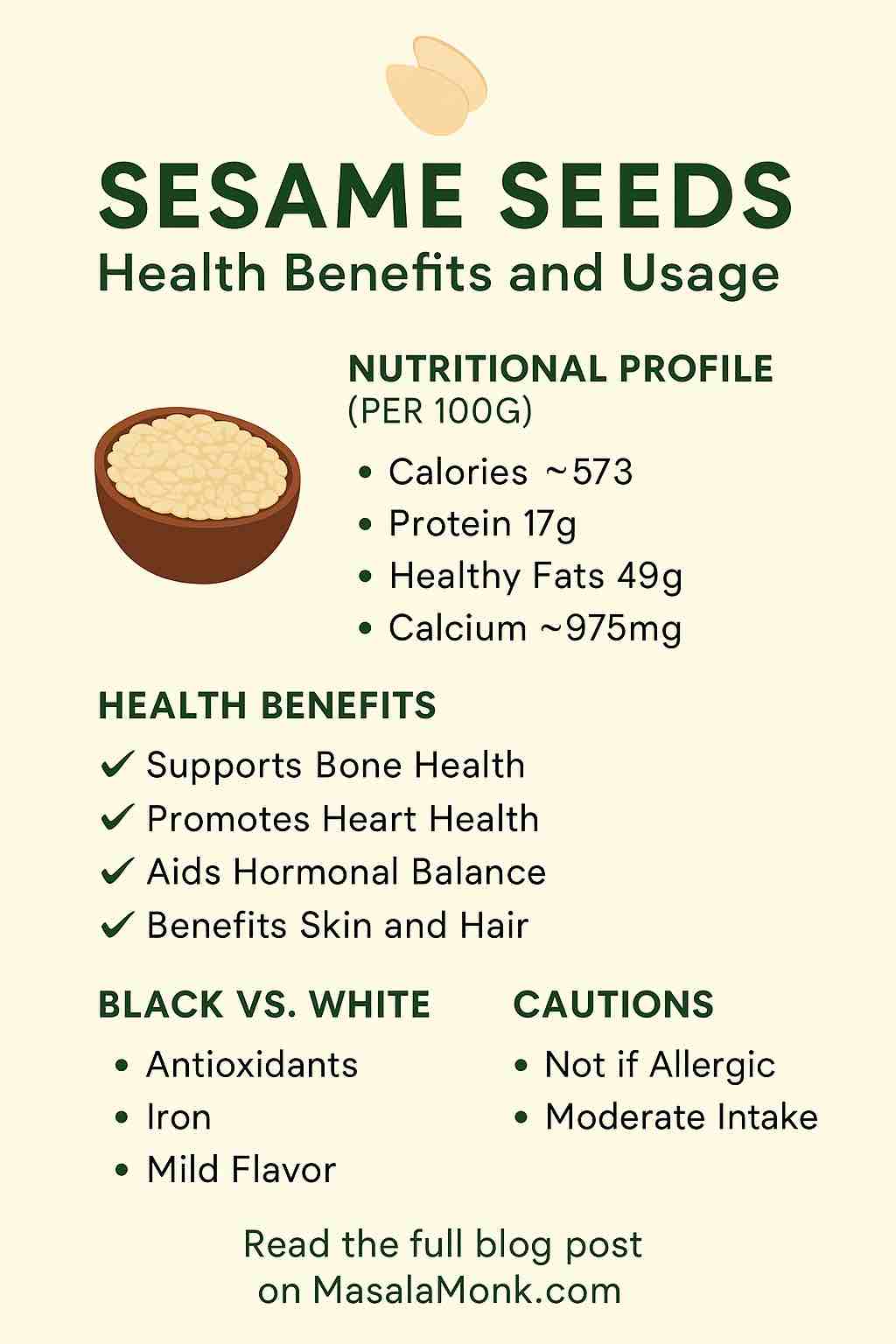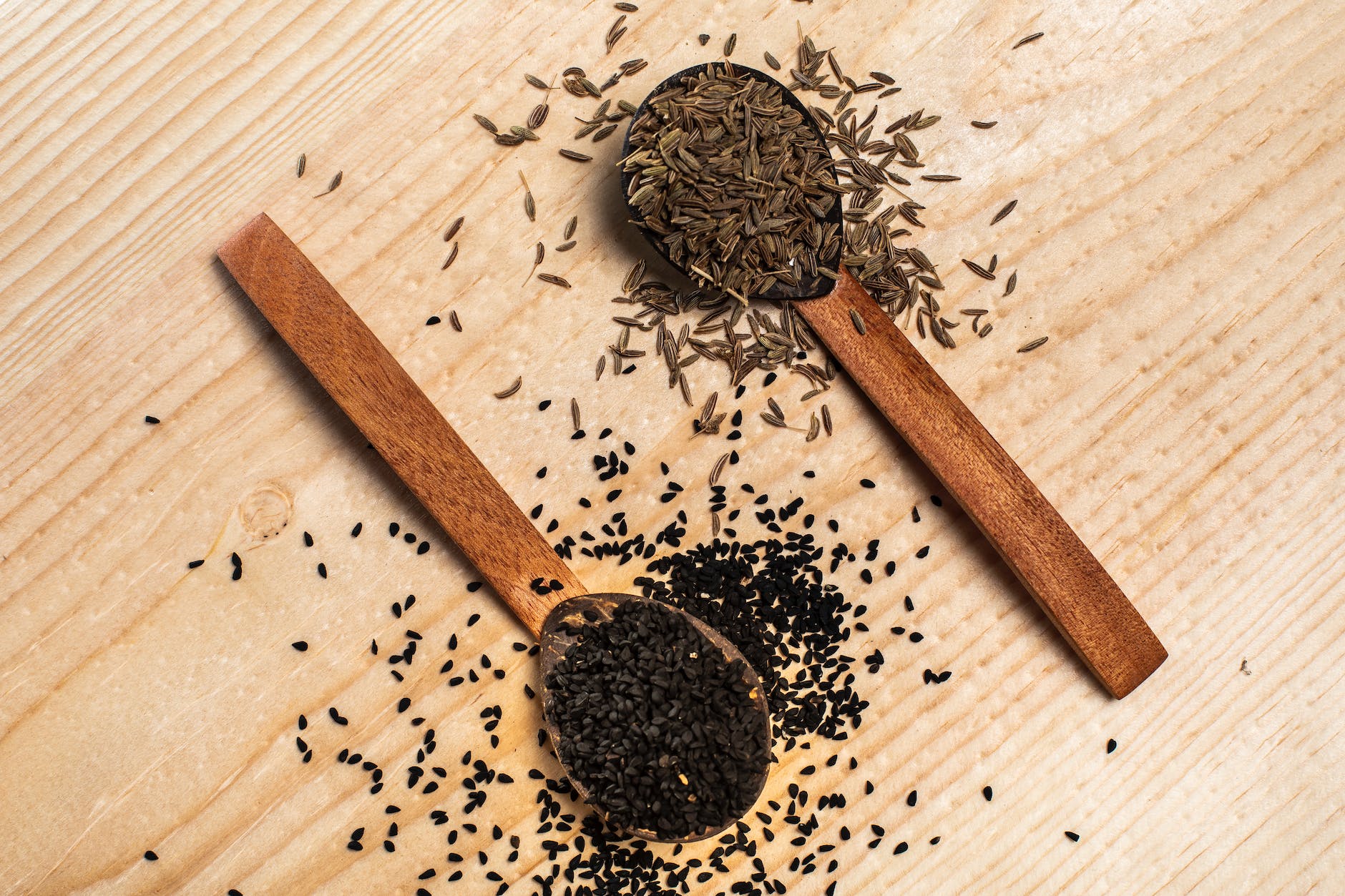
Sesame seeds—tiny, oil-rich seeds from the Sesamum indicum plant—have been revered for thousands of years. Whether used in Ayurveda, traditional Chinese medicine, or modern health routines, their appeal lies in their versatility, nutrient density, and wide-ranging health benefits.
In this comprehensive guide, we’ll explore:
- Nutritional breakdown
- How much to eat daily
- Key health benefits (especially for women)
- Black vs. white sesame
- Whether raw seeds are safe
- Seed cycling and hormone balance
Let’s dive in.
🌱 What Are Sesame Seeds?
Sesame seeds are small, flat seeds that come in several colors—white, black, brown, and golden. Each variety has subtle differences in taste, nutrition, and health applications.
- White sesame: Most commonly used in cooking; mild and nutty in flavor.
- Black sesame: Slightly bitter, with a stronger aroma; traditionally prized for longevity and hair health.
🧬 Nutritional Profile of Sesame Seeds
Here’s a glance at the nutrition per 100g of raw sesame seeds:
| Nutrient | Amount |
|---|---|
| Energy | ~573 kcal |
| Protein | 17g |
| Total Fat | 49g (85% unsaturated) |
| Fiber | 12g |
| Calcium | ~975 mg |
| Magnesium | ~350 mg |
| Iron | ~14.5 mg |
| Zinc | ~7.8 mg |
| Vitamin B1 (Thiamine) | ~0.8 mg |
| Antioxidants | Sesamin, sesamol |
🔎 Note: Nutrient content may vary slightly between black and white sesame seeds.
🌟 Health Benefits of Sesame Seeds
✅ 1. Bone Health
- High calcium, magnesium, and phosphorus make sesame ideal for maintaining bone density.
- Particularly important for postmenopausal women, who face higher osteoporosis risk.
✅ 2. Heart Health
- Rich in unsaturated fats and phytosterols, sesame seeds help lower LDL cholesterol.
- Lignans and sesamin reduce inflammation and support vascular health.
✅ 3. Hormonal Balance (Especially for Women)
- Phytoestrogens (plant-based estrogens) in sesame support hormone regulation.
- Helpful during PMS, perimenopause, and menopause.
- A key ingredient in seed cycling, a natural method for menstrual regulation.
✅ 4. Hair and Skin Health
- Zinc, B vitamins, and antioxidants support collagen production and hair follicle health.
- Black sesame is traditionally used for hair growth and reversing premature greying.
✅ 5. Digestive Support
- The fiber content (12g per 100g) improves gut motility, relieves constipation, and promotes a healthy microbiome.
✅ 6. Anti-Inflammatory & Antioxidant Effects
- Compounds like sesamin, sesamol, and sesamolin protect cells from oxidative stress and reduce inflammation markers.
⚖️ How Much Sesame Should You Eat Daily?
✅ Recommended Daily Intake:
- 1–2 tablespoons (9–18g) per day is ideal for most adults.
| Goal | Suggested Amount |
|---|---|
| General wellness | 1 tbsp |
| Bone and hormonal support | 1.5–2 tbsp |
| Skin & hair improvement | 1–1.5 tbsp |
| During menopause | 2 tbsp (split doses) |
📝 Start small and increase gradually if you’re new to sesame.
🕒 Best Time to Eat Sesame Seeds
| Time | Why It Works |
|---|---|
| Morning | Boosts energy and digestion |
| Evening | Particularly black sesame: calming, supports hair health |
| With meals | Enhances nutrient absorption (esp. fat-soluble vitamins) |
| Before meals | Roasted sesame stimulates digestive enzymes |
🍽️ How to Use Sesame Seeds
- Raw: Sprinkle on oats, smoothies, yogurt
- Roasted: Intensifies nutty flavor; great for snacking or toppings
- Tahini (paste): Use in hummus, dressings, or sauces
- Sesame oil: For sautéing or finishing dishes
- Sweet dishes: Tilgul, ladoos, sesame brittle
👩⚕️ White Sesame Seeds Benefits for Women
White sesame seeds are particularly rich in:
- Calcium, vital for bone density and PMS cramp relief
- Iron, helpful during menstruation and for women with anemia
- Zinc & B6, supporting fertility and hormonal balance
- Phytoestrogens, which may relieve hot flashes, irregular cycles, and menopausal mood swings
Women who consume sesame seeds regularly often report:
- Fewer menstrual cramps
- Improved skin glow
- Stronger nails and hair
🟢 Pro tip: Combine with flaxseeds during seed cycling for better hormonal regulation.
⚫️ Black vs. White Sesame Seeds: Key Differences
| Feature | White Sesame | Black Sesame |
|---|---|---|
| Flavor | Mild, nutty | Earthy, slightly bitter |
| Antioxidants | Moderate | Higher (due to outer hull) |
| Iron & Calcium | Present | Slightly higher |
| Traditional Use | Cooking & oil | TCM, Ayurveda (longevity, grey hair) |
| Appearance in food | Common in bakery/savory | Used in desserts, tonics |
Use both for a full spectrum of benefits:
- White for daily cooking
- Black for skin, liver, and hair rejuvenation
🍴 Can You Eat Raw Sesame Seeds?
Yes, but with considerations:
| Form | Pros | Cons |
|---|---|---|
| Raw | Nutrient-rich, unprocessed | Harder to digest; contains oxalates |
| Roasted | Easier to digest, better taste | Slight loss of B-vitamins |
| Soaked | Softens texture, reduces anti-nutrients | Slightly alters flavor |
| Ground | Best absorption (e.g., tahini) | Shorter shelf life |
✅ Best approach: Lightly roast or grind for better digestibility and nutrient availability.
🔄 Seed Cycling with Sesame: Hormonal Support Made Easy
Seed cycling is a holistic nutrition strategy that uses specific seeds during different phases of the menstrual cycle to promote hormonal balance.
🌀 How Sesame Fits In:
| Cycle Phase | Seeds Used | Purpose |
|---|---|---|
| Luteal (Day 15–28) | Sesame + Sunflower | Supports progesterone, reduces PMS |
How to Use:
- 1 tbsp ground sesame + 1 tbsp sunflower daily during the luteal phase.
- Consume with smoothies, yogurt, or oats.
Benefits:
- Reduced cramps, bloating, and mood swings
- Regulated cycle length
- Natural support during perimenopause and PCOS
🔍 Tip: For best results, use ground seeds and stay consistent for at least 3 cycles.
⚠️ Side Effects & Precautions
Though sesame is safe for most people, here’s what to keep in mind:
- Allergy alert: Sesame is now recognized as a top allergen in many countries.
- Digestive discomfort: May occur if consumed raw in excess.
- Caloric density: 2 tablespoons = ~120 kcal; moderate if watching calories.
🧠 Final Thoughts
Sesame seeds may be small, but their health benefits are mighty. Whether you’re seeking better bones, balanced hormones, glowing skin, or just a daily nutrient boost, they deserve a spot in your kitchen.
From raw to roasted, black to white, or in tahini and ladoos, there’s no shortage of ways to include sesame seeds in your routine.
✅ Frequently Asked Questions (FAQs)
1. How many sesame seeds should I eat per day?
Answer:
Most adults can consume 1 to 2 tablespoons (9–18g) of sesame seeds daily. This amount offers key nutrients without overloading on calories or fats. Start with 1 tablespoon if you’re new to sesame.
2. Are there different benefits between black and white sesame seeds?
Answer:
Yes. Black sesame seeds are richer in antioxidants and iron, often used in traditional medicine for hair health and anti-aging. White sesame seeds are milder, easier to digest, and commonly used in cooking. Both are highly nutritious.
3. Can I eat sesame seeds raw, or should they be roasted?
Answer:
You can eat sesame seeds raw, but roasting or soaking makes them easier to digest and enhances their nutty flavor. Grinding them (like in tahini) increases nutrient absorption.
4. Are sesame seeds good for women’s health?
Answer:
Absolutely. Sesame seeds support bone health, hormonal balance, skin, and hair—thanks to their calcium, magnesium, zinc, and plant estrogens (phytoestrogens). Especially beneficial during PMS, menopause, and fertility phases.
5. What are the benefits of sesame seeds for hormonal balance?
Answer:
Sesame seeds are rich in lignans, which help regulate estrogen and progesterone levels. They are often used in seed cycling to support menstrual health and relieve symptoms like cramps, mood swings, and irregular cycles.
6. Is there a best time to eat sesame seeds?
Answer:
Morning is ideal for digestion and energy. Black sesame seeds are great at night for calming effects and supporting skin/hair health. Sesame can also be eaten with meals to enhance nutrient absorption.
7. Can sesame seeds help with weight loss?
Answer:
Yes, in moderation. Sesame seeds are high in fiber and healthy fats, which help you feel full and stabilize blood sugar levels. But they are calorie-dense, so limit to 1–2 tablespoons daily.
8. Is sesame safe for daily consumption?
Answer:
Yes, for most people. Just stay within 1–2 tablespoons per day. People with sesame allergies should avoid it. Overconsumption may cause digestive discomfort or excess calorie intake.
9. How do I use sesame seeds in my meals?
Answer:
Sprinkle them on salads, oatmeal, rice, or yogurt. Roast them for snacks. Use tahini in sauces and dips. Add to traditional dishes like ladoos, chutneys, or sesame brittle.
10. What is seed cycling, and how is sesame used in it?
Answer:
Seed cycling is a natural method to balance hormones using specific seeds during your menstrual cycle. Sesame seeds are consumed in the luteal phase (Day 15–28) to support progesterone. Combine with sunflower seeds for best results.










